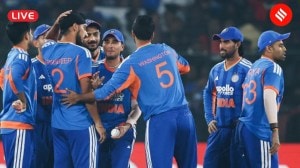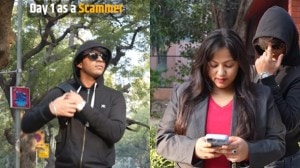At protests supporting Rahul, united colour of Opposition: Black
Politicians, especially from the Congress, are known to be partial to white. But they have often taken to the colour to mark their protest through their sartorial choice.
 Opposition MPs, including Congress president Mallikarjun Kharge, wearing black over the disqualification of Congress leader Rahul Gandhi from Lok Sabha, protest over the Adani Group issue at Parliament House complex during Budget Session, in New Delhi, Monday, March 27. (PTI Photo)
Opposition MPs, including Congress president Mallikarjun Kharge, wearing black over the disqualification of Congress leader Rahul Gandhi from Lok Sabha, protest over the Adani Group issue at Parliament House complex during Budget Session, in New Delhi, Monday, March 27. (PTI Photo)Opposition leaders on Monday wore black in protest against the “illegal disqualification” of Congress leader Rahul Gandhi from the House. As soon as the House met, Congress MPs T N Prathapan Hibi Eden, Jothi Mani S, and Ramya Haridas rushed to the Well of the House, tore the papers in their hands, and hurled them at Speaker Om Birla. Some of the MPs also waved black cloth at the Speaker. Birla then adjourned the proceedings till 4 pm.
Politicians, especially from the Congress, are known to be partial to white. But they have often taken to the colour to mark their protest. Last August too, the party sported all black in its bid to raise the pitch against the Narendra Modi government over price rise, unemployment, and the Goods and Services Tax (GST). On Monday, sixteen Congress MLA were suspended from Gujarat Assembly till the end of the ongoing Budget Session after they protested in the House wearing black clothes.
Black as a symbol to needle the authority in power has been around for a while. There have also been reports on the “unofficial ban” on black in Kerala Chief Minister Pinarayi Vijayan’s events. The colour seemed to have irked Prime Minister Narendra Modi too.
The Pinarayi Vijayan government in Kerala, with which the Congress is trying to navigate its position on Rahul Gandhi’s disqualification, has increasingly faced attacks over “high-handedness”. This unofficial “ban” is also sometimes taken to extreme lengths. In February, the Kerala Police removed a black flag put up as a mark of mourning following the death of former CPI(M) legislator C P Kunju before Vijayan turned up to express his condolences at his home. At another function at a college in Kozhikode, students were advised not to wear black masks, while black bags were not allowed into the auditorium.
In December 2017, there were reports of people wearing black upper garments not being allowed entry into a Modi public meeting. In January 2018, an order was issued in Jharkhand prohibiting black “shawls, trousers, shirts, coats, sweaters, mufflers, socks, ties, bags and shoes” at a Modi event, fearing the possibility of a black flag being waved at him.
On March 6 last year, those attending a Modi rally in Pune were reportedly asked to avoid any black masks, socks, and in some cases, shirts.
On July 4 of the same year, two Congress workers were arrested on the charge of releasing black balloons near the Vijayawada International Airport as a chopper carrying the PM was taking off.
Black flags were also put up by farmers in Punjab to mark six months of their protest against three farm laws that now stand repealed. Anti-Citizenship Amendment Act (CAA) protesters in Assam observed a “black day” on December 11, 2021, to mark the second anniversary of the passage of the Act in Parliament and waved black flags and banners denouncing the “unjustly imposed” law.
In 2018, after police firing in Tuticorin left dead several protesters opposing the expansion of a Vedanta unit, DMK MLAs dressed in black demanded the resignation of then Chief Minister Edappadi K Palaniswami.
The same year, pro-Tamil groups protesting on the Cauvery water issue showed black flags to Modi when he arrived to inaugurate a defence exhibition near Chennai.
Among the first to use black as a symbol of protest was the radical Black Panther Party in the US, which adopted a full-black uniform, including a defining black beret in the late 1960s.
In 2019, the Chinese government, which lets few gestures pass muster, ordered courier companies to halt the export of “yellow helmets, yellow umbrellas, flags, flagpoles, poster banners, gloves, masks, black T-shirts, metal rods, fluorescent tubes, bludgeon clubs”, as per a South China Morning Post report. This was after huge protests in Hong Kong against an extradition Bill. The protests were carried out by Hong Kong residents predominantly dressed in black clothes believed to have been sourced from mainland China.
Hong Kong residents have long resorted to black to express their dissent against China, whether the 2012 protests against the amendment to make Chinese curriculum compulsory in city schools, or the pro-democracy marches in 2017.
In 2018, black as a protest also appeared on the red carpet when many actors in the US wore it to put a spotlight on the Time’s Up movement, which drew inspiration from Me Too.
Speaking to The New York Times, Dr Erin Vearncombe, assistant professor at the University of Toronto, said, black clothing “remains a hugely significant form of oppositional dress”. “It signals everything from independent thought to outright defiance and revolution.”
Incidentally, the Congress has also been at the receiving end. In 2012, those wearing black pullovers, cardigans, jackets or shawls were reportedly not allowed at a Rahul Gandhi rally in Ferozepur, Punjab.
- 01
- 02
- 03
- 04
- 05






























